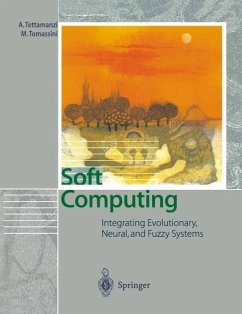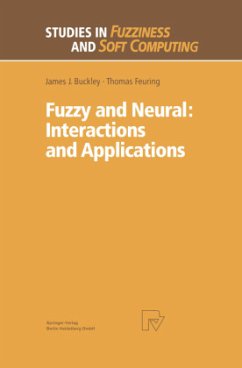
Introduction to Neuro-Fuzzy Systems

PAYBACK Punkte
20 °P sammeln!
This book contains introductory material to neuro-fuzzy systems. Its main purpose is to explain the information processing in mostly-used fuzzy inference systems, neural networks and neuro-fuzzy systems. More than 180 figures and a large number of (numerical) exercises (with solutions) have been inserted to explain the principles of fuzzy, neural and neuro-fuzzy systems. Also the mathematics applied in the models is carefully explained, and in many cases exact computational formulas have been derived for the rules in error correction learning procedures.Numerous models treated in the book will help the reader to design his own neuro-fuzzy system for his specific (managerial, industrial, financial) problem. The book can serve as a textbook for students in computer and management sciences who are interested in adaptive technologies.
Fuzzy sets were introduced by Zadeh (1965) as a means of representing and manipulating data that was not precise, but rather fuzzy. Fuzzy logic pro vides an inference morphology that enables approximate human reasoning capabilities to be applied to knowledge-based systems. The theory of fuzzy logic provides a mathematical strength to capture the uncertainties associ ated with human cognitive processes, such as thinking and reasoning. The conventional approaches to knowledge representation lack the means for rep resentating the meaning of fuzzy concepts. As a consequence, the approaches based on first order logic and classical probablity theory do not provide an appropriate conceptual framework for dealing with the representation of com monsense knowledge, since such knowledge is by its nature both lexically imprecise and noncategorical. The developement of fuzzy logic was motivated in large measure by the need for a conceptual framework which can address the issue of uncertainty and lexical imprecision. Some of the essential characteristics of fuzzy logic relate to the following [242]. - In fuzzy logic, exact reasoning is viewed as a limiting case of ap proximate reasoning. - In fuzzy logic, everything is a matter of degree. - In fuzzy logic, knowledge is interpreted a collection of elastic or, equivalently, fuzzy constraint on a collection of variables. - Inference is viewed as a process of propagation of elastic con straints. - Any logical system can be fuzzified. There are two main characteristics of fuzzy systems that give them better performance für specific applications.














